
FORMER US PRESIDENT, NOW NOBEL PRIZE LAUREATE
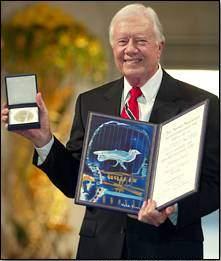
Former US President
Jimmy Carter getting
Nobel Prize on December 11, 2002 in Oslo, Norway
Former U.S. President Jimmy
Carter accepted the 2002 Nobel Peace Prize on Tuesday, an award that recognized
a life of public service.
In his acceptance speech, Carter urged people everywhere to work for peace
in a world that has become "a more dangerous place."

"It is with a deep sense of gratitude that I accept this prize," Carter said. "I
am grateful to my wife, Rosalyn, to my colleagues at the Carter Center and to
the many others who continue to seek an end to violence and suffering throughout
the world."
In what seemed to be a veiled reference to U.S. threats of military action
against Iraq, Carter talked about war.
"Instead of entering a millennium of peace, the world is now, in many ways, a
more dangerous place. The greater ease of travel and communication has not been
matched by equal understanding and mutual respect," he said.
"War may sometimes be a necessary evil. But no matter how necessary, it is
always an evil, never a good. We will not learn to live together in peace by
killing each other's children."
He urged respect for the United Nations and said the United States, as the last
superpower, has "not assumed that super strength guarantees super wisdom."
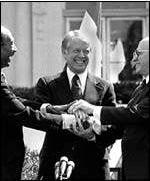
Carter's nomination for the Nobel Prize is in recognition of decades of work for
peace, human rights and democracy, from Cuba to North Korea.
At a news conference in Oslo on the eve of receiving his $1 million prize,
Carter himself reckoned he was getting the award for 20 years of work at his
Carter Center in Atlanta, Georgia, rather than his deeds as president.
While president, he came close to winning the Nobel Peace Prize in 1978, when
Israeli Prime Minister Menachem Begin and Egyptian President Anwar Sadat shared
the award for a peace deal he brokered.
Carter says he was disappointed in the presidents after him -- Ronald Reagan,
George H. W. Bush and Bill Clinton -- for not capitalizing on the Camp David
Accords he brokered.
In addition, Carter urged the United States to respect the United Nations'
rulings on policy over Iraq.
Carter also called for renewed efforts to solve "the festering problem" of
Israel and its neighbors.
Carter told a news conference on Monday: "If there is (Iraqi) compliance, as
judged by the U.N. Security Council, then I see no reason for armed conflict."
President George W. Bush has threatened to take military action to oust Iraqi
President Saddam Hussein, with or without U.N. support, if Washington judges
that Baghdad has lied about its weapons.
Carter spoke as experts in New York and Austria began analyzing the contents of
Iraq's dossier detailing its weapons programs. (Full story)
The 78-year-old statesman, who was U.S. president from 1977 to 1981, said Iraq
appeared to be complying with U.N. inspectors so far, based on evidence from
U.N. officials.
"The United Nations is the best place for nations to resolve the differences
that always exist," he said.
But he warned that conflict would be "quite likely" if Iraq did not remove or
account for all o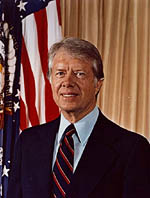 f
its weapons.
f
its weapons.
Gunnar Berge, chairman of Peace Prize committee, said when the prize was
announced that giving it to Carter should be considered a "kick in the leg" to
Bush for his hard line against Iraq.
Carter also expressed hope for implementation of a 1967 U.N. resolution telling
Israel to withdraw from occupied territories in return for other nations
respecting its right to live in peace within secure borders.
He said: "One of the key factors that arouses intense feelings of animosity in
the world is the festering problem in the Holy Land, the Israeli occupation of
the West Bank and Gaza and the inability of Israel to live in peace with its
neighbors.
"I think this is the single most disturbing element in animosities and
misunderstandings and hatred and even violence in the world.
"I think that is an exacerbating factor in dividing people, not only in the West
Bank, Gaza and Israel, but also throughout the world."
Jimmy Carter (James Earl Carter, Jr.), thirty-ninth president of the United
States, was born October 1, 1924, in the small farming town of Plains, Georgia,
and grew up in the nearby community of Archery. His father, James Earl Carter,
Sr., was a farmer and businessman; his mother, Lillian Gordy, a registered
nurse.
He was educated in the Plains public schools, attended Georgia Southwestern
College and the Georgia Institute of Technology, and received a B.S. degree from
the United States Naval Academy in 1946. In the Navy he became a submariner,
serving in both the Atlantic and Pacific fleets and rising to the rank of
lieutenant. Chosen by Admiral Hyman Rickover for the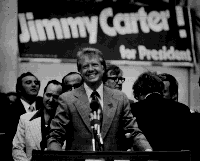 nuclear submarine program, he was assigned to Schenectady, N.Y., where he took
graduate work at Union College in reactor technology and nuclear physics, and
served as senior officer of the pre-commissioning crew of the Seawolf.
nuclear submarine program, he was assigned to Schenectady, N.Y., where he took
graduate work at Union College in reactor technology and nuclear physics, and
served as senior officer of the pre-commissioning crew of the Seawolf.
On July 7, 1946, he married Rosalynn Smith. When his father died in 1953, he
resigned his naval commission and took his family back to Plains. He took over
the Carter farms, and he and Rosalynn operated Carter's Warehouse, a
general-purpose seed and farm supply company. He quickly became a leader of the
community, serving on county boards supervising education, the hospital
authority, and the library. In 1962 he won election to the Georgia Senate. He
lost his first gubernatorial campaign in 1966, but won the next election,
becoming Georgia's 76th governor on January 12, 1971. He was the Democratic
National Committee campaign chairman for the 1974 congressional elections.
On December 12, 1974, he announced his candidacy for President of the United
States. He won his party's nomination on the first ballot at the 1976 Democratic
National Convention, and was elected President on November 2, 1976.
Jimmy Carter served as President from January 20, 1977 to January 20, 1981.
Significant foreign policy accomplishments of his administration included the
Panama Canal treaties, the Camp David Accords, the treaty of peace between Egypt
and Israel, the SALT II treaty with the Soviet Union, and the establishment of
U.S. diplomatic relations with the People's Republic of China. He championed
human rights throughout the world. On the domestic side, the administration's
achievements included a comprehensive energy program conducted by a new
Department of Energy; deregulation in energy, transportation, communications,
and finance; major educational programs under a new Department of Education; and
major environmental protection legislation, including the Alaska National
Interest Lands Conservation Act.
Mr. Carter is the author of sixteen books, many of which are now in revised
editions: Why Not the Best? 1975, 1996; A Government as Good as Its People,
1977, 1996; Keeping Faith: Memoirs of a President, 1982, 1995; Negotiation: The
Alternative to Hostility, 1984; The Blood of Abraham, 1985, 1993; Everything to
Gain: Making the Most of the Rest of Your Life, written with Rosalynn Carter,
1987, 1995; An Outdoor Journal, 1988, 1994; Turning Point: A Candidate, a State,
and a Nation Come of Age, 1992, Talking Peace: A Vision for the Next Generation,
1993, 1995; Always a Reckoning, 1995; The Little Baby Snoogle-Fleejer,
illustrated by Amy Carter, 1995; Living Faith, 1996; Sources of Strength:
Meditations on Scripture for a Living Faith, 1997; The Virtues of Aging, 1998;
An Hour before Daylight: Memoirs of a Rural Boyhood, 2001; and Christmas in
Plains: Memories, 2001.
In 1982, he became University Distinguished Professor at Emory University in
Atlanta, Georgia,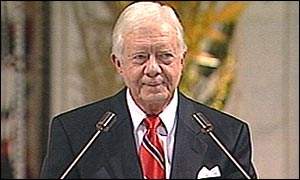 and founded The Carter Center in Atlanta. Actively guided by President Carter,
the nonpartisan and nonprofit center addresses national and international issues
of public policy. Carter Center fellows, associates and staff join with
President Carter in efforts to resolve conflict, promote democracy, protect
human rights, and prevent disease and other afflictions. Through the Global 2000
program, the Center advances health and agriculture in the developing world.
and founded The Carter Center in Atlanta. Actively guided by President Carter,
the nonpartisan and nonprofit center addresses national and international issues
of public policy. Carter Center fellows, associates and staff join with
President Carter in efforts to resolve conflict, promote democracy, protect
human rights, and prevent disease and other afflictions. Through the Global 2000
program, the Center advances health and agriculture in the developing world.
The permanent facilities of The Carter Presidential Center were dedicated in
October, 1986, and include the Jimmy Carter Library and Museum, administered by
the National Archives and Records Administration. Also open to visitors is the
Jimmy Carter National Historic Site in Plains and Jimmy Carter's boyhood farm in
Archery, administered by the National Park Service.
President Carter and Rosalynn are regular volunteers for Habitat for Humanity, a
nonprofit organization that helps needy people in the United States and in other
countries renovate and build homes for themselves. He also teaches Sunday School
and is a deacon in the Maranatha Baptist Church of Plains. For recreation, he
enjoys fly-fishing, woodworking, jogging, cycling, tennis and skiing.
On October 11, 2002, the Norwegian Nobel Committee announced it was awarding the
Nobel Peace Prize for 2002 to Mr. Carter "for his decades of untiring effort to
find peaceful solutions to international conflicts, to advance democracy and
human rights, and to promote economic and social development."



 f
its weapons.
f
its weapons.  nuclear submarine program, he was assigned to Schenectady, N.Y., where he took
graduate work at Union College in reactor technology and nuclear physics, and
served as senior officer of the pre-commissioning crew of the Seawolf.
nuclear submarine program, he was assigned to Schenectady, N.Y., where he took
graduate work at Union College in reactor technology and nuclear physics, and
served as senior officer of the pre-commissioning crew of the Seawolf.